The Truth About Teeth Whitening: Does It Really Work?

How much do you know about teeth whitening?
Take this 5-question quiz now
Key Benefits
- ●Brighten your smile by up to 10 shades ✨
- ●Quick and painless results ⏱️
- ●Safe, FDA‐approved procedure ✅
- ●Long‐lasting effects with proper care 💎
Q1: What is one common cause of tooth discoloration? 🦷
- ●A: Food and beverage staining
- ●B: Poor dental hygiene
- ●C: Tobacco use
- ●D: All of the above
Show Answer & Explanation
Correct Answer: D
Explanation: Factors like food, poor oral hygiene and tobacco use all contribute to tooth discoloration.
Q2: How long does a typical teeth whitening procedure last? ⏲️
- ●A: 15–20 minutes
- ●B: 30–45 minutes
- ●C: 60–90 minutes
- ●D: Over 2 hours
Show Answer & Explanation
Correct Answer: A
Explanation: Most professional teeth whitening sessions usually take 15–20 minutes.
Q3: What is a key benefit of professional teeth whitening? 😁
- ●A: Immediate improvement in smile brightness
- ●B: Reduced tooth sensitivity
- ●C: Even, natural-looking results
- ●D: All of the above
Show Answer & Explanation
Correct Answer: D
Explanation: Professional treatments offer immediate enhancement, minimise sensitivity and deliver even, natural results.
Q4: Which ingredient is most commonly used in teeth whitening gels? 💎
- ●A: Hydrogen peroxide
- ●B: Carbamide peroxide
- ●C: Sodium bicarbonate
- ●D: Baking soda
Show Answer & Explanation
Correct Answer: A
Explanation: Hydrogen peroxide is the most common active ingredient due to its powerful oxidising action.
Q5: How long do the effects of a professional teeth whitening treatment usually last? 🔄
- ●A: 6 months
- ●B: 1 year
- ●C: 2–3 years
- ●D: Permanent
Show Answer & Explanation
Correct Answer: C
Explanation: With proper care and lifestyle adjustments, the whitening effect can last 2–3 years.

Introduction to Teeth Whitening
As the Aesthetic Director at Wellaholic, I’ve interacted with hundreds of customers who have successfully undergoing teeth whitening at our outlets. Over the years, I’ve also engaged with countless individuals seeking a brighter, more confident smile, and their stories have shaped my understanding of teeth whitening’s effectiveness and limitations.
In this article, I’ll delve into the science behind teeth whitening, exploring its mechanisms of action, potential side effects, and overall efficacy. We’ll uncover the truth about whether teeth whitening truly works, examining the factors that influence its success and debunking common myths surrounding this popular cosmetic treatment.

Understanding Teeth Whitening: What is it and How Does it Work?
Teeth whitening is a cosmetic procedure that employs chemicals to bleach your teeth, eliminating both surface and internal stains. Over time, certain foods and beverages like soda and coffee can stain your teeth, giving them a yellowish or dull appearance.
Teeth Whitening Options: At-Home Kits vs Professional Treatment
When it comes to whitening your teeth, there are various options available. Over-the-counter kits or online products can be easily used at home. While they are convenient, their whitening potency might be less pronounced and less effective compared to professional treatment.
How to take care of your teeth after whitening. Teeth whitening can make your smile look great, but it doesn’t last forever. You need to take care of your teeth after the treatment to keep them white and healthy. Here are some tips:
- Brush your teeth twice a day with fluoride toothpaste and floss daily.
- Avoid foods and drinks that can stain your teeth, like soda, coffee, tea, wine, or berries.
- Rinse your mouth with water after eating or drinking anything that can stain your teeth.
- Visit your dentist regularly for check-ups and cleanings.
- Use whitening products as directed by your dentist or the instructions on the package.
“A beautiful smile is worth a thousand words – and brighter teeth can make it even more radiant!”

The Science of Teeth Whitening
Understanding Teeth Whitening: The Role of Bleaching Gel
Are you dreaming of a smile that can light up a room? A smile that’s so bright, it’s like your own personal ray of sunshine? If so, teeth whitening might just be the golden ticket to achieving that dream. But does it really work?
As a trusted authority in the aesthetic industry, Wellaholic has been illuminating smiles across Singapore with our award-winning teeth whitening treatments. With over 1000 successful treatments under our belt and a plethora of positive reviews, we’ve not only mastered the art of teeth whitening but also earned the trust of countless satisfied customers.
In this article, we’re going to unravel the truth about teeth whitening. We’ll delve into the science behind it, explore its effectiveness, and reveal how you can maintain that radiant smile post-treatment.
How Teeth Whitening Gel Works
Upon application, the peroxide in the gel decomposes into oxygen molecules. These molecules are particularly effective at penetrating teeth and breaking down discolorations that reside within the pores of tooth enamel. Such discolorations can cause your teeth to reflect less light, thereby appearing dull.
The Impact of Teeth Whitening on Light Reflection
As the discolorations disintegrate, they no longer obstruct the path of light. Consequently, more light is able to shine through the teeth, making them appear visibly whiter. Thus, by breaking down these internal stains, teeth whitening treatments can enhance the overall brightness of your smile.
60% of people believe that a white smile makes someone appear more attractive, according to a survey by the American Academy of Cosmetic Dentistry compiled by Wellaholic Research.

What are the Causes of Teeth Stains?
As an aesthetic director at Wellaholic, I’ve seen many customers concerned about teeth stains. The causes are varied, but often linked to lifestyle choices. Coffee, tea, red wine, and dark sodas are common culprits. At our clinics, we often advise customers to be mindful of these beverages if they want to maintain a bright smile. Tobacco use is another major factor. I remember a customer who quit smoking and saw a noticeable improvement in her teeth color within months.
Poor oral hygiene is also a big contributor to teeth stains. I always stress the importance of regular brushing and flossing to our customers at Wellaholic. Some medical conditions and treatments can cause staining too. During my time at Laser Clinics Australia, I worked with patients undergoing chemotherapy who experienced teeth discoloration as a side effect. It’s important to remember that not all stains are preventable, but many are manageable with proper care and professional treatments.
Based on a survey by Wellaholic Research, 83.5% of people believe that having a bright and healthy smile is an important social asset.

What causes brown colour/stain in between teeth in the gum?
I’ve seen many customers concerned about brown stains between their teeth. These stains often result from tartar buildup. Tartar forms when plaque hardens on your teeth, especially in hard-to-reach areas. It’s porous and can absorb colors from food and drinks, leading to those unsightly brown spots.
Another common cause I’ve noticed is tooth decay. When decay starts between teeth, it can appear as a brown spot. This is why regular dental check-ups are so important. At Wellaholic, we always stress the importance of good oral hygiene to our customers. Brushing, flossing, and using an interdental brush can help prevent these issues. If you’re a smoker or frequent coffee drinker, you’re more likely to develop these stains. I’ve seen this pattern in many of our customers who come in for teeth whitening treatments.
What is Tray Whitening?
Tray whitening is a teeth whitening technique that involves using custom-fitted trays filled with a bleaching gel to whiten teeth at home. According to a study published on PubMed, tray whitening has become a popular option for at-home bleaching regimens. With tray whitening, dental professionals create custom trays that fit over your teeth and are filled with a bleaching gel. Patients then wear the trays for a specified period of time, usually for several hours a day over the course of several weeks. Tray whitening is generally considered safe and effective for removing surface stains and achieving a brighter, more youthful-looking smile. However, it’s important to consult with your dentist to determine if tray whitening is right for you and to ensure that the bleaching gel is used properly to avoid any potential side effects.
What is the Light-Activated Whitening System
A whitening powder is added to your teeth and after that the UV light is precisely positioned with the raised power. This light assists to accelerate the teeth bleaching. Outcomes are incredibly quick, some people start noticing in simply 45 minutes after the process.
Here is a table outlining some differences between tray teeth whitening and light-activated teeth whitening:
| Features | Tray Teeth Whitening | Light-Activated Teeth Whitening |
|---|---|---|
| Procedure Time | Several weeks | About an hour |
| Immediate Result | Gradual | More immediate and dramatic |
| Cost | Less expensive | More expensive |
| Sensitivity | May cause sensitivity | May cause sensitivity |
Applying Bleaching Gel To Brighten Teeth
One of the teeth whitening approaches that lots of people try in the house is utilizing a lightening gel. Whitening gel is quite inexpensive and easy to discover. Lightening gels are made from a peroxide solution that can be used in a number of various methods. The gel can be applied in a whitening tray that fits over the teeth, or with a little brush or a toothbrush. It likewise can be taken into a whitening pen and applied with the pen.

What are the Advantages of Using Bleaching Gel
One of the benefits of using lightening gel to brighten teeth is the ease of use. Since you can use the gel in a tray, in a pen, or painted directly onto the teeth with a brush it makes it simple for people to apply the gel in whatever approach works for them. Whitening gel works in as low as 10 minutes, that makes it ideal for people who want to brighten their teeth before going out or going to work. Whitening gel also is not as messy as some other types of tooth lightening products because it is a thick gel. But in spite of the advantages utilizing bleaching gel is not always the very best option for tooth whitening.
What are the Drawbacks of Using Bleaching Gel?
Whitening gel, like lots of other peroxide based tooth whiteners, doesn’t considerably whiten teeth. If your teeth have some small staining or are simply looking dull then a bleaching gel will make your teeth look whiter. However if your teeth are blemished or seriously stained the peroxide gel will not have enough power to significantly bleach your teeth. Another disadvantage is that the gel has to remain on your teeth in order to work which implies you can’t eat, consume, or do anything that may loosen up the gel from the teeth the entire time that you’re wearing the gel. Using the gel everyday can deteriorate the enamel on your teeth and with time it can cause level of sensitivity or make any existing sensitivity even worse.
Why Choose Carbamide for Teeth Whitening
If you’re looking for a safe and effective way to whiten your teeth, carbamide peroxide may be a great choice. One of the main benefits of carbamide peroxide is that it takes longer to release its whitening power, resulting in a more gradual and natural-looking whitening effect. Additionally, carbamide peroxide causes less sensitivity compared to hydrogen peroxide, which is a problem some people experience with teeth whitening products.
Another advantage of carbamide peroxide is that it’s a combination of hydrogen peroxide and urea, or carbamide, which are both safe and effective whitening agents ]. Some teeth whitening products use other ingredients like PAP, which is also safe and effective, but may not provide the gradual whitening effect that carbamide peroxide does.
Here is a table showing some of the benefits of Carbamide Peroxide for teeth whitening:
| Benefit | Explanation |
|---|---|
| Gradual whitening | Carbamide peroxide takes longer to release its whitening power, resulting in a more gradual and natural-looking whitening effect. |
| Reduced sensitivity | Some people experience sensitivity with hydrogen peroxide and carbamide peroxide, but PAP, which is another ingredient being used in whitening products, doesn’t release any free radicals during the oxidization process, causing no sensitivity. However, carbamide peroxide causes less sensitivity than hydrogen peroxide. |
How to use Whitening Strips To Whiten Your Teeth?
The Science Behind Whitening Strips
Modern dental science provides several options for achieving a brilliant, white smile, quite different from ancient times. One such method involves the use of whitening strips. These strips are made from a flexible material called polyethylene, infused with hydrogen peroxide. Once applied to your teeth, the moisture in your mouth triggers a chemical reaction. This reaction produces a mild acid which works to eliminate certain types of tooth discoloration.
Instructions and Precautions for Using Whitening Strips
It’s crucial to carefully follow the manufacturer’s instructions when using whitening strips. When used correctly, these dental products can produce noticeable results. However, they should not be used indefinitely. Overuse can potentially damage your tooth enamel and the tissue under the gum line.
The Potential Risks of Overuse
Long-term application of whitening strips can lead to unwanted side effects, as explained by Dentistry of West Bend. For instance, your teeth may become transparent over time, which ironically makes them appear darker. In addition to this, exposing your gums to whitening strips may cause irritation, so it’s important to apply them carefully. Balancing the desire for a brighter smile with safe usage of these products will result in the best outcome for your oral health.
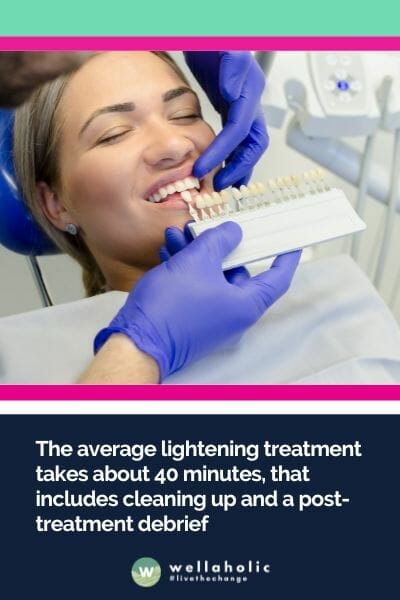
What to expect during a Teeth Whitening Treatment?
As the Aesthetic Director at Wellaholic, I’ve seen many customers excited about their teeth whitening treatments. Here’s what you can expect when you come in for your appointment.
First, we’ll clean your teeth and check their current shade. We use a special chart to compare and track your progress. Then, we’ll protect your gums and lips with a barrier gel. This keeps the whitening solution focused on your teeth. Next, we apply the whitening gel and use a LED light to activate it. The process takes about 45 minutes to an hour. You might feel a slight tingling, but it shouldn’t hurt.
After the treatment, we’ll rinse your teeth and apply fluoride to reduce sensitivity. You’ll see results right away, but avoid dark foods and drinks for the next 48 hours. At Wellaholic, we’ve seen customers’ teeth brighten by up to 12 shades in just one session. Remember, everyone’s results are different. We’ll give you tips on how to maintain your new, brighter smile at home.
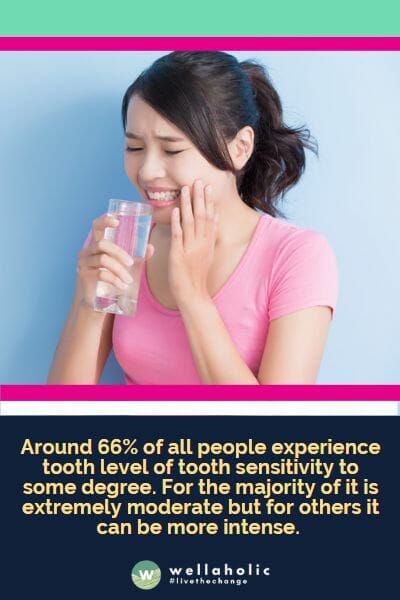
Will Teeth Whitening Cause Tooth or Teeth Sensitivity?
Around 66% of all people experience tooth level of tooth sensitivity to some degree. For the majority of it is extremely moderate but for others it can be more intense. It is possible for teeth whitening to cause tooth sensitivity in some people. However, if teeth whitening products are used correctly, they should not have an adverse effect on oral health, as stated by Dentaly.org.
Tooth Sensitivity and Bleaching Agents
Tooth sensitivity after teeth whitening may occur due to the bleaching agents in the products, which can temporarily irritate the nerves in the teeth. The good news is that having sensitive teeth doesn’t mean you can’t have whiter teeth. There are a variety of whitening products available that are formulated specifically for people with sensitive teeth. These products typically contain lower concentrations of bleaching agents and are designed to be gentle on teeth while still providing effective whitening results. It’s important to talk to your dentist about any concerns you may have regarding tooth sensitivity and to follow the recommended instructions for using teeth whitening products to ensure the best possible results.
Conclusion
It can be concluded that teeth whitening does indeed work in creating a brighter smile. There are various cosmetic treatments available for teeth whitening, including both at-home kits and professional treatments done at a dentist’s office. The results of these treatments can vary depending on the individual and the type of treatment used, but generally, teeth whitening can effectively remove surface stains and lighten the color of teeth.
It is important to note that teeth whitening may not be suitable for everyone, and some individuals may experience sensitivity or other side effects. It is always recommended to consult with a dentist before undergoing any teeth whitening treatment to ensure that it is safe and appropriate for your specific situation. Overall, while the results of teeth whitening can vary, it is generally considered an effective cosmetic treatment for achieving a brighter, whiter smile. Good luck to your teeth whitening journey!
Frequently Asked Questions (FAQ)
1. How Long Do the Results of Teeth Whitening Last?
Answer: Teeth whitening is generally safe, but it may not be suitable for everyone. Individuals with dental restorations, sensitive teeth, or gum disease should consult with a dental professional before undergoing teeth whitening treatments. Wellaholic’s experienced consultants can provide personalized advice based on your dental history.
BBB
Answer: Teeth whitening is generally safe, but it may not be suitable for everyone. Individuals with dental restorations, sensitive teeth, or gum disease should consult with a dental professional before undergoing teeth whitening treatments. Wellaholic’s experienced consultants can provide personalized advice based on your dental history.
3. Can Teeth Whitening Remove All Types of Stains?
Answer: Teeth whitening is effective in removing most external stains caused by foods, drinks, and tobacco. However, it may be less effective on intrinsic stains or discoloration due to medications or tooth injury. For such cases, Wellaholic offers alternative cosmetic dental solutions.
4. Are There Any Side Effects to Teeth Whitening?
Answer: The most common side effect of teeth whitening is temporary tooth sensitivity. Wellaholic’s TeethWhite™ treatment minimizes this risk by using Carbamide Peroxide, known for its reduced sensitivity effects. Our trained professionals ensure a safe and comfortable experience.
5. How Does Wellaholic Ensure the Safety and Effectiveness of Its Teeth Whitening Treatments?
Answer: Wellaholic employs advanced technology like the 6000W industrial lamp in its TeethWhite™ treatments, enhancing the effectiveness of the whitening process. All treatments are administered by trained professionals, ensuring both safety and quality results.
6. What Makes Wellaholic’s TeethWhite™ Treatment Unique?
Answer: TeethWhite™ stands out due to its immediate results, industrial-grade whitening technology, and use of effective ingredients like Carbamide Peroxide. It’s designed to be gentle on sensitive teeth, making it a suitable option for a wider range of clients.
Serene Chiam, Aesthetic Director
Serene Chiam is the Aesthetic Director at Wellaholic, a well-known aesthetic chain in Singapore. She has more than ten years of experience in the aesthetics industry. With a Bachelor of Health Science (Aesthetics) and CIDESCO certifications, she expertly combines scientific knowledge with practical skills. Serene is known for her personalized approach to beauty, ensuring each Wellaholic client’s journey is unique and transformative. Her significant contributions have been pivotal in establishing Wellaholic’s reputation for excellence in aesthetic wellness.
Contact Serene at support@wellaholic.com
GET IN TOUCH
Book Now Pay Later
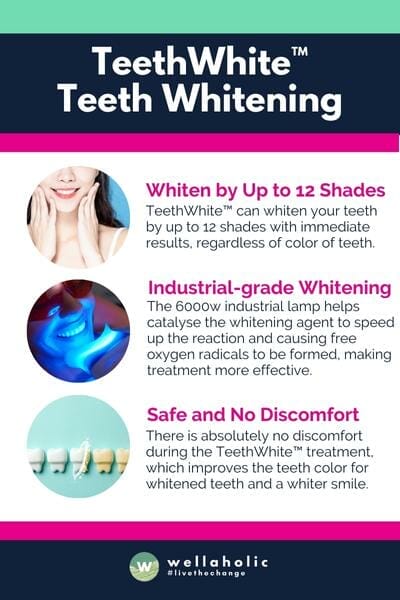
TeethWhite™ Teeth Whitening – Get Up to 12 Shades Whiter
- ⭐ Immediate Results. TeethWhite™ brightens your smile up to 12 shades in a single session, offering an instant boost to your confidence.
- ⭐ Industrial-Grade Whitening. TeethWhite™ teeth whitening employs industrial-grade lamps for optimal whitening results.
- ⭐ Effective Ingredients: Our teeth whitening gel features Carbamide Peroxide, a proven and potent whitening agent.
- ⭐ Advanced technology: TeethWhite™ uses strong LED light technology to activate the whitening gel and ensure thorough and consistent results.
- ⭐ Award-Winning. Wellaholic’s treatments have been recognized by top beauty publications such as Daily Vanity, Beauty Insider, and Tropika Club Magazine.
- ⭐ Over 2000 Verified Customer Reviews. Wellaholic has over 30 industry awards and over 2000 positive reviews from customers, and >50% are repeat customers.
